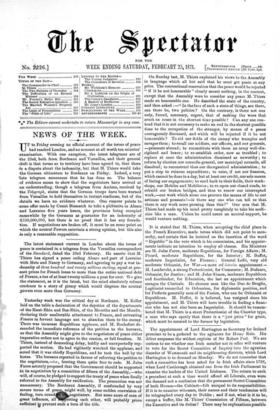Yesterday week was the critical day at Bordeaux. M. Keller
laid on the table a declaration of the deputies of the departments of the Haut-Rhin and Bas-Rhin, of the Meurthe and the Moselle, declaring their unalterable attachment to France, and entreating France in fervent language not to abandon them to the enemy. "There was immense Republican applause, and M. Rochefort de- manded the immediate reference of the petition to the bureau; :so that the Assembly might give to the negotiators of peace either imperative orders not to agree to the cession, or full freedom. M. Thiers, instead of demanding delay, boldly and unexpectedly sup- ported the motion. He had vigilantly watched the applause, and noted that it was chiefly Republican, and he took the bull by the horns. The bureaux reported in favour of referring the petition to the negotiators,—i.e., leaving them quite free to cede. M. Jules Favre astutely proposed that the Government should be supported in its negotiation by a committee of fifteen of the Assembly,—who will, of course, be pledged to support the treaty of peace when finally referred to the Assembly for ratification. The precaution was not unnecessary. The. Bordeaux Assembly, if confounded by very severe terms of peac might well, by some sudden convulsion of feeling, turn round egotiators. But some score of men of great influence, all orting each other, will probably prove sufficient ti• prevent such a turn of the tide.


































